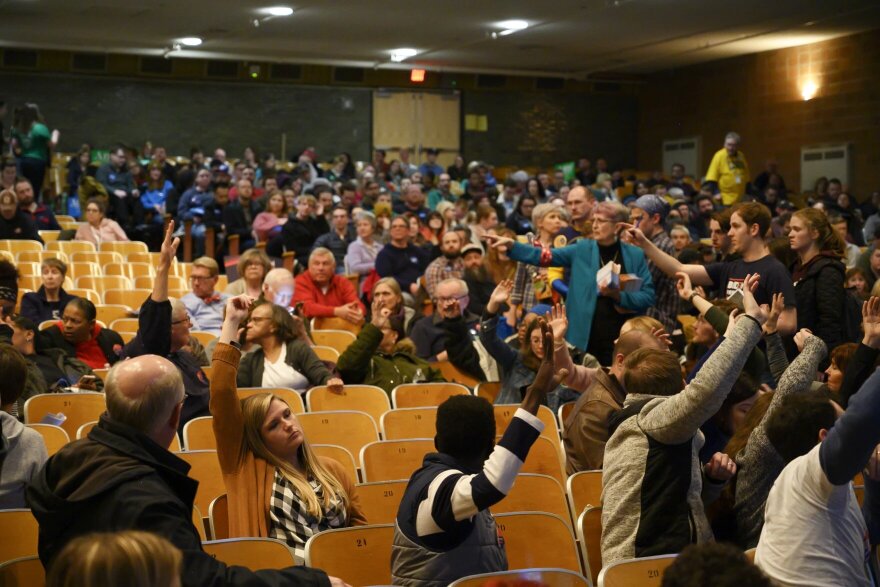Members of the Democratic National Committee will meet Friday to decide on the order in which states go in picking their presidential nominee in 2024.
Iowa has appeared doomed following its disastrous caucus night in 2020. Add to that, a red wave swept the statein the midterm elections.
Iowan Scott Brennan, a longtime member of the committee and a two-time former state party chair, believes Iowa should keep its first-in-the-nation status, though he knew convincing others wouldn’t be easy.
“The former head of the DNC Tom Perez hated caucuses and so I knew going into 2022 that it was going to be an uphill battle the whole way.”
Nearing the end of 2022, Iowa is still first — for now.
Members of the DNC Rules and Bylaws committee say they want states that are competitive in a general election going early. They favor primaries over caucuses as well as diverse states, which adds up to plenty of opposition against Iowa.
"I knew going into 2022 that it was going to be an uphill battle the whole way."Scott Brennan, Iowan on DNC
Brennan argues the early window of Iowa, New Hampshire, Nevada and South Carolina results in Democrats winning the popular vote. He pointed out that President Joe Biden didn’t do well in the first three contests in 2020 and then won in South Carolina.
“That's how the process should work,” he said. “You know, sometimes you get a Barack Obama who comes out of Iowa and that carries him on, but if you recall, even in ‘08, Barack Obama won Iowa and then Hillary Clinton won New Hampshire.”
The state party hasproposed big changesto the caucuses to please the group. People would mail in presidential preference cards that would be counted on caucus night when a winner would be declared.
This summer, Iowa was among16 states and Puerto Rico auditioning in Washington, D.C. to go early.
Some of the members seemed interested in replacing Iowa with another Midwestern state. Committee member Mo Elleithee called both Minnesota and Michigan “very strong,” but gave credit to Iowa for reimagining what their caucuses would look like.
The committee planned to make a decision in August, but pushed the decision until after the midterms — an election that went poorly for Iowa Democrats.
“We kind of got our butts kicked across the board,” said Ras Smith, a former state lawmaker from Waterloo.
Smith was a rising star in the Iowa Democratic Party. He launched a bid for governor but dropped out when he couldn’t get support from his own party. Despite his problems with the party, however, he still argues that the Iowa caucuses should go early, partly because Iowa’s cheap media market makes for underdog victories.

“Maybe this is old school, but at 35, I hold dear to the process of connecting with another human being to talk about our issues. If you lose that, then you’re just paying for elections, and that's not representative to democracy, right? That's not a people-first government.”
There is also a state law that says Iowa’s caucuses have to go before any other primary election, and the Republican Legislature won’t change that.
Still, there are Democrats in the state who don’t fault the national party for wanting to move on.
"I hold dear to the process of connecting with another human being to talk about our issues. If you lose that, then you’re just paying for elections, and that's not representative to democracy, right?"Ras Smith, former state lawmaker from Waterloo
Vanessa Marcano-Kelly, a native of Venezuela who became an American citizen before the 2020 caucuses, volunteered for Bernie Sanders’ 2016 and 2020 Iowa caucus campaigns, then caucused for him.
She said she’s disappointed it might be the end of an era.
“I wasn't part of that era for too long. I was only able to participate just one time, and so in that the one time that I did get to participate it's kind of a disconnect, because I participated in a bilingual caucus that had child care and heard of other caucuses that were run in four different languages simultaneously.”
The DNC’s meeting on Friday won’t be a done deal. The full committee would need to finalize their decision early next year — a year when Republicans flirting with a presidential run will be spending time in Iowa with or without the Democrats.






